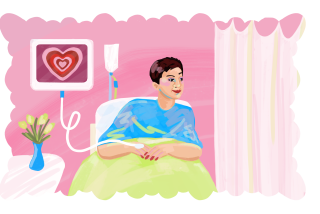Advice -- straight up
- Share via
I pulled a chart from the rack on the examination room door. It was empty, except for a demographics sheet -- a new patient, Ms. Cornish (name changed), age 47. I knocked twice on the door and entered.
“Good morning, I’m Dr. Shaw,” I said. I flipped open the chart and asked, “You are Judith Cornish?” then extended my hand in greeting. She sat, leaning forward in a chair, one very lean leg crossed over the other.
“Good morning, yes, I’m Judy,” she said in a husky voice. She shook my hand.
In the five seconds it took to introduce ourselves, I had already processed a huge amount of diagnostic information:
One, her hand was cool. Most likely this was poor circulation from anxiety or smoking, though less common causes were certainly possible.
Two, she was thin and sat with the familiar posture that we in medicine see frequently in undernourished alcoholics. (This may seem presumptuous, and certainly first impressions require confirmation, but experience is a good teacher.)
Three, her voice was raspy. The odds were high that she was a heavy smoker (this was confirmed later by the smell of smoke on her clothes and by my questioning).
Four, her skin was pale and prematurely wrinkled for a 47-year-old. Again, cigarettes and alcohol were the likely culprits.
Five, the dermatological diagnosis was psoriasis, at least. (I detected telltale signs on her hands and scalp.)
Finally, I could see in her face and body language that she was guarded, as if she wore a sign that said “emotionally fragile: handle with care.” I would need to do just that.
“How can I help you?” I asked.
“You can help me with this!” she said, pulling up sleeves and pants to expose her elbows and knees, which were covered with large areas of pink, scaly skin characteristic of psoriasis.
“How long has this been a problem for you?” I asked.
“A few months, maybe a year,” she said.
“Any treatments so far?”
“No.”
“Do you take any medications?” (Some common drugs can make psoriasis worse.)
“No.”
I asked her about other health problems -- she had none that she knew of -- and whether she had seen her family doctor recently -- she hadn’t -- and after some additional questions, finally arrived at the alcohol and cigarettes.
“About a pack a day,” she said. “And I have a few drinks every day.”
“Beer, wine? What do you drink normally?”
“Vodka, mostly.”
My preliminary diagnosis was psoriasis with alcohol and tobacco abuse as contributing factors. I asked her to put on a gown, after which I examined her and returned for the discussion.
“You have a condition called psoriasis,” I said, and went on to explain the disease. “But what I am most worried about is your alcohol consumption. We know that cigarettes and alcohol make psoriasis worse, but my biggest concern is that you are drinking enough alcohol to threaten your general health and your life.”
Ms. Cornish sat back in her chair, folded her arms and turned to the side. Her silence told me she was not happy with the assessment.
I continued: “I’m going to treat your psoriasis with these creams, but I encourage you to think about the alcohol and cut down or stop if you can. Your skin would probably improve on its own. Not everyone can do it alone. You might need help. I suggest that you talk to your primary care doctor, get your liver checked and have a physical examination. I’d like to see your progress in two or three months.”
“Well, I’ll think about it,” she said. Her tone was indignant, and I didn’t expect her to follow my advice or even return.
Ms. Cornish did not return in three months, or in six months.
It was not until a year later that I saw her again. I looked at the chart before entering the exam room and remembered our first encounter. This could be difficult, I thought.
“Hello, Ms. Cornish,” I said.
She started right in: “Hi, Dr. Shaw. You know, I’m sorry for not coming back sooner, but I need to tell you something.”
Her eyes moistened. “You saved my life.”
Astonished, I raised my eyebrows as if to say, “Is there more?” All I could do was listen, show interest, so that she would open up. Clearly, there was more to tell.
She continued: “Remember last year when you told me about alcohol? I resented it at the time, and continued to drink -- more, in fact -- and my skin got worse. But I kept thinking about what you said, until it finally sunk in that you could be right.
“Anyway, I stopped drinking six months ago, and now I feel great and my skin is much better. I was sliding down a slippery path.”
I asked her if she’d stopped drinking on her own, and she said that yes, she had. I told her that was wonderful -- that she must be a strong-willed person and should feel proud of herself. She said she’d been drinking herself to death and didn’t know it.
“You were the only person who has ever been concerned about it,” she said. “I came in today to say thank you.”
--
Her comment made my day, my week. It is not often that a dermatologist hears the words “you saved my life.” Of course, it might not have been entirely true, but it was gratifying to know that my advice about a problem tangential to her immediate skin problem had influenced Ms. Cornish’s destructive lifestyle in a positive way.
In medicine, we don’t expect to receive praise for what we do, and successful treatments are often taken for granted (as they should be, to a certain extent). To hear Ms. Cornish’s appreciation was indeed special.
We went on to address her skin briefly, and at the end of the visit, I couldn’t help myself from saying, “Now, Ms. Cornish, how about the smoking? Can you start thinking about cutting back or stopping?”
“That’s next, Dr. Shaw. I’m working on it,” she said.
“One thing at a time,” we said in unison.
--
James Channing Shaw is a dermatologist at the University of Toronto. He can be contacted at jc.shaw@utoronto.ca.


